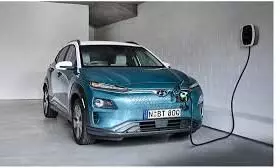
India needs Rs 1,200 crore for electric car revolution: top scientist
text_fieldsIndia's leading scientist has outlined a new plan for advancing e-mobility, suggesting that a government investment of Rs 1,200 crore in research and development (R&D) could position India as a global leader in electric vehicles (EVs) within five years.
As the Union Budget approaches, there are high hopes for increased incentives for EVs.
India, grappling with severe air pollution, sees e-mobility as a key solution, especially in major cities.
The country's chief scientist, Professor Ajay Kumar Sood, recently released the "e-Mobility R&D Roadmap for India." He emphasized that with strategic investment, India could see significant advancements in the EV sector in less than five years.
Professor Sood, the Principal Scientific Adviser to the Government of India, told NDTV that internal combustion engines powered by petrol and diesel are nearing obsolescence, with EVs set to become the dominant mode of transport. He noted that in the first half of 2024, India sold nearly 900,000 electric vehicles, but the goal is to increase this market penetration to 30% by 2030.
The roadmap identifies four critical areas for research: energy storage cells, electric vehicle components, materials and recycling, and charging infrastructure. These areas are crucial for India to achieve self-reliance and global leadership in the EV sector over the next five years.
Professor Sood highlighted the need for breakthroughs in battery technology to make EVs more affordable and widespread. Promising research is currently underway on sodium-ion and aluminum-ion batteries, which could lead to cheaper, lighter, safer, and more durable batteries.
India aims to reduce emission intensity by 45% by 2030 and achieve energy independence by 2047, in line with its commitment to net-zero emissions by 2070. A significant part of this strategy involves wider adoption of EVs, domestic production of energy storage systems, and the generation of renewable energy for charging infrastructures. Currently, the e-mobility value chain in India is heavily reliant on imports.
The e-mobility R&D roadmap provides a detailed plan to achieve self-sufficiency, with targeted research initiatives that will place India at the forefront of the global EV supply chain within the next five to seven years. While some projects identified in the roadmap are already successful internationally, others are yet to be explored, presenting opportunities for India to innovate and lead in these areas.
Professor Sood stressed the importance of aligning the rapid growth of India's automobile sector with the country's Net-Zero vision. He called for a culture of R&D and innovation-driven growth to sustain this alignment.
Supporting this vision, Professor Karthick Athmanathan, the lead author of the report and a Professor of Practice at IIT Madras, pointed out the necessity for India to move away from its current dependence on imports. Although this is a challenging goal, Professor Sood is confident that India can become a leader in the global EV supply chain by becoming self-sufficient in this critical sector.






















